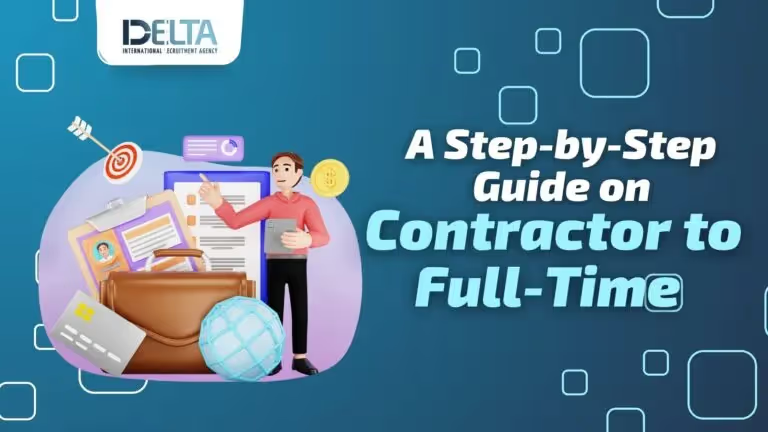Lots of companies, especially those dealing with work around the world, like to hire helpers (we call them contractors or freelancers). It helps them avoid the tricky rules of hiring people from different countries. This way, they can get the job done without getting tangled up in a bunch of rules.
But, there’s a little problem. Sometimes, these helpers end up doing a lot of work that looks a whole lot like what a full-time friend (employee) would do. Now, let’s talk about the great part is turning those helpers into full-time friends.
It’s like giving them a permanent recruitment seat at the work table. This move brings more stability and makes them feel like a true part of the team. But, before jumping into this big change, it’s important to think about the kind of work needed, how the company plans to grow, and what the rules say. It’s like picking the best path for everyone involved!
Advantages of Turning Helpers (Contractors or Freelancers) into Full-Time Team Members
Making the shift from a helper (like a contractor or freelancer) to a full-time teammate brings a bag full of benefits. Let’s dive into why this change can be a game-changer for you:
- Stability: Enjoy a steady income and job security as a full-time teammate. No more hustling to find new gigs or clients regularly—just a reliable paycheck you can count on.
- Career Growth: Embrace more opportunities for growth within your job. As a full-timer, you can join training programs, take on exciting new tasks, and work your way up the career ladder.
- Teamwork Vibes: Immerse yourself in a collaborative work environment. Full-time teammates have more chances to work closely with others, fostering creativity, better problem-solving, and an overall enjoyable work experience.
- Benefits Boost: Unlock additional perks like health insurance, retirement plans, and paid time off. These benefits not only sweeten the deal but also contribute significantly to your overall compensation and commitment to your employer.
- Feeling at Home: Joining a team cultivates a sense of belonging and ownership in the organization. As a full-time teammate, you’ll feel more connected to your work and the company, leading to increased job satisfaction.
Embrace the positive changes that come with being a full-time teammate—it’s not just a job; it’s a journey of growth and fulfillment!

Image Source: designtaxi.com
Thinking About Making Freelancers Full-Time? 7 Things to Keep in Mind
Thinking of turning your helper (like a contractor or freelancer) into a full-time teammate? Here’s a handy guide to keep it smooth and legal. It’s a good idea to talk to a global employment law expert or someone from HR to make sure everything follows the rules. Here are 7 important things to keep in mind:
1. Classification: Make sure your helper is put in the right category. Laws, like the UK’s IR35, are there to stop tax tricks. Misclassifying can lead to big fines.
2. Job Duties: Check if your helper’s job matches the new full-time gig. This might mean creating a new job description, setting goals, and explaining their role in the team.
3. Legal and Tax Rules: Moving from helper to teammate might mean dealing with different rules in the helper’s country. Think payroll taxes, social security, and other work-related taxes.
4. Pay and Perks: Decide on the right salary and perks for the new full-timer. Look at what others in the industry get, the person’s skills, your budget, and any new perks they’ll get. You might need to talk about a new pay deal.
5. Following Laws: Make sure the new job follows all the work laws in that country. This includes minimum pay, overtime rules, and treating everyone fairly.
6. Giving Notice: Check if there’s any notice needed when making this change. Tell the helper in advance about the job switch or any changes to their pay or perks. If things don’t work out, notice rules also apply when ending the full-time job.
7. Clear Communication: Talk openly with your helper during the switch. Make sure they get what’s happening, their new job, and any changes in pay or perks. Clear communication keeps everyone on the same page.
Switching Helpers to Full-Time Teammates: A Guide with Employer of Record (EOR)
Ever heard of an Employer of Record (EOR)? It’s like a helper for companies that want to hire people from different countries without getting into a bunch of legal stuff. The EOR becomes the official boss, taking care of all the work-related rules and paperwork.
Why Use EOR for Turning Helpers into Teammates?
- Following Local Rules: EORs know the local rules about hiring people. They make sure the whole process follows the laws in that place.
- Easy Paperwork: EORs handle all the paperwork jobs, like paying salaries and following tax rules. This means the company can focus on their main work without getting bogged down by paperwork.
- Saving Money: By letting EORs take care of paperwork, companies save money. They don’t have to set up their own legal stuff in that country.
- Quick and Smooth Change: EORs are pros at turning helpers into full-time teammates. They have the skills and tools to make it happen fast and easy.

Image Source: oysterhr.com
Easy Steps for Using an EOR to Convert a Contractor into an Employee
- Find a Good EOR Provider:
- Search for a trustworthy EOR provider with experience in the contractor’s country.
Check reviews from other clients to make sure they’re reliable.
- Search for a trustworthy EOR provider with experience in the contractor’s country.
- Negotiate with the EOR:
- Talk to the EOR provider about the terms of employment.
Discuss salary, benefits, work schedule, and other important details.
- Talk to the EOR provider about the terms of employment.
- Sign an Agreement:
- Once you agree on everything, sign a clear agreement with the EOR provider.
Include responsibilities, payment terms, communication channels, and more.
- Once you agree on everything, sign a clear agreement with the EOR provider.
- Provide Contractor Details:
- Give the EOR provider all the necessary info about the contractor.
Include their name, job title, job description, and any other relevant details.
- Give the EOR provider all the necessary info about the contractor.
- Contractor Signs Employment Agreement:
- The contractor signs an employment agreement with the EOR provider.
This agreement lays out the terms and conditions of employment.
- The contractor signs an employment agreement with the EOR provider.
- EOR Hires Contractor on Your Behalf:
- The EOR provider legally hires the contractor as a full-time employee for you.
They take care of administrative tasks like payroll, taxes, benefits, and legal compliance.
- The EOR provider legally hires the contractor as a full-time employee for you.
- Contractor Starts Working Full-Time:
- Once the employment agreement is signed, the contractor can start working as a full-time
employee.
The EOR provider handles all the administrative tasks for the employee.
- Once the employment agreement is signed, the contractor can start working as a full-time
employee.
Conclusion
Turning contractors or freelancers into full-time employees is a tricky process that needs careful thinking about legal and money stuff. If you work with a Recruitment Agency like Delta International Recruitment Agency, it can make things easier and make sure you follow the rules in your area. Make sure to pick a Recruitment Agency that’s known for doing a good job, and keep talking openly and clearly during the whole conversion process.
In general, making contractors or freelancers into full-time employees can be a clever move for bosses who want a team that’s loyal and works well. If you think about the good and tricky parts of the process and use a Recruitment Agency in Pakistan for Qatar when it fits, you can make sure the change for your workers goes smoothly and follows the rules.




























